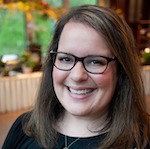Elizabeth Paige Fierman
Elizabeth Paige Fierman (IMC15)

Senior Manager for Events and Marketing at ESPN
Elizabeth Paige Fierman (IMC15) has had, as she describes it, "a non-traditional path" around the departments within ESPN, which helped her learn the ins and outs of the company. That path made her transition to the ESPN events and marketing team seamless while her experience in the Integrated Marketing Communications master's program has helped her grow into her new role and its responsibilities.
Fierman says many of the skills she learned during her Medill experience are central to the work she does now. She credits her Medill education for helping her become more confident and enabling her to develop a strong perspective as a marketer.
Tell us about your career path so far.
I started my career in collegiate athletics, working both at a conference commissioner’s office and in athletic media relations before starting my journey at ESPN in 2011. I’ve had a fairly non-traditional path around the company but I am grateful for the diverse experiences that led me to a role that’s a perfect fit for me.
My first role at ESPN was with its Stats & Information Group, which was a great entry point that allowed me to touch a variety of functions within the company. After two years, I moved onto the Diversity, Inclusion and Wellness team, which taught me so much about our organizational structure and how/why decisions are made. Beginning in 2015, I started working in Events and Marketing, focused on ESPN Radio and ESPN Podcasts. I’ve grown in that role, and my work has evolved along with our business over the last six years.
What are your main responsibilities at ESPN?
I oversee many of our audience engagement touchpoints, primarily through live events for ESPN’s Audio division. This ranges from ESPN Radio’s footprint leading up to championship events like the College Football Playoff National Championship and the Super Bowl to live podcast events in music venues and comedy clubs across the country. I even oversee our presence at some business-to-business/industry events like conferences and trade shows. I have recently taken on social strategy for our division and work closely with our brand marketing and partner marketing functions, as well as our content, sponsorship and distribution teams.
How do you apply the IMC way of thinking that uses both art and science in your job?
I focus heavily on audience engagement and experience, which was so central in many of my IMC courses. At ESPN, we want to learn about what our consumers gravitate toward and then create experiences and opportunities around that. There’s a ton of creativity in the community building and sponsor integration aspect of what I do but also so much detail and research that goes into what markets we activate in, our scheduling strategy, content approach, marketplace trends, etc.
Has your IMC degree help you make your career advancements?
The lessons learned during my IMC journey were invaluable in making me more confident and knowledgeable about the field. Beyond that, though, one of the most impactful outcomes for me was that my investment in myself and my career became a springboard for conversations that helped me pivot the direction of my career. I think I would have oftentimes been dismissed from consideration for roles strictly based on the story my resume told, but being able to build the narrative around my decision to attend Medill and study IMC helped to open a lot of doors and start a lot of conversations that led to my current role.
What other types of master’s programs did you consider?
Medill IMC is the only graduate program I seriously considered–needless to say, I was thrilled to have been accepted! The history, reputation and alumni network of Medill was an immediate draw, but as someone who was a journalism major as an undergrad at Boston University, I loved the lens of IMC compared to an MBA–it felt most relevant to me both in terms of my educational experience and my professional goals.
What is an experience or class from the IMC program that stands out for you?
I participated in a weeklong leadership immersion with my classmates, and one session with Associate Professor Tom Collinger left me speechless. I’ve carried it with me–and passed it along to others–regularly in the years that have followed. He encouraged us to do a bit of soul searching to take inventory of things we enjoyed and didn’t enjoy and things we were good at and not so good at – professional, personal… everything. We divided these up along an x- and y-axis to create four quadrants that ultimately represented development opportunities, areas that could cause professional frustration, things to steer clear of and things that were our bread and butter where we’d naturally excel. It was so eye-opening and is an exercise I’ve revisited often.
How have the Northwestern Medill network helped you in your career?
It’s brought me closer to a lot of people at my own company that I might not have otherwise known, which has been really fun and has helped me forge connections with others across the industry.
What advice do you have for someone considering Medill?
In the words of Nike, “Just do it.” Looking back, I often wonder how I found the time to work full-time, take classes, volunteer and prioritize myself and my family, but when something’s important to you, you make it work. I couldn’t be happier with the investment I made in myself and my career and couldn’t imagine having done it anywhere other than Medill.

